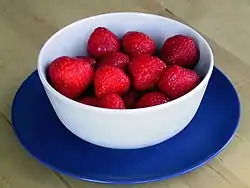jordbær
Danish

Etymology
From Old Norse jǫrðber, from Proto-Germanic *erþōbazją; equivalent to jord (“earth, soil, ground”) + bær (“berry”), as the berries are close to the ground, cognate with Icelandic jarðarber, Old Swedish iordhbær, Old English eorþberġe, Dutch aardbei, and German Erdbeere.
Pronunciation
- IPA(key): /ˈjorˌbɛr/, [ˈjoɐ̯ˌb̥ɛɐ̯], [ˈjoɐ̯ˌpɛɐ̯]
Inflection
| neuter gender |
Singular | Plural | ||
|---|---|---|---|---|
| indefinite | definite | indefinite | definite | |
| nominative | jordbær | jordbærret | jordbær | jordbærrene |
| genitive | jordbærs | jordbærrets | jordbærs | jordbærrenes |
Inflection
| common gender |
Singular | Plural | ||
|---|---|---|---|---|
| indefinite | definite | indefinite | definite | |
| nominative | jordbær | jordbærren | jordbær | jordbærrene |
| genitive | jordbærs | jordbærrens | jordbærs | jordbærrenes |
References
- “jordbær” in Den Danske Ordbog
Norwegian Bokmål
Etymology
From Old Norse jǫrðber, from Proto-Germanic *erþōbazją; equivalent to jord + bær; cognate with Icelandic jarðarber, Old Swedish iordhbær, Old English eorþberġe, Dutch aardbei, and German Erdbeere.
Pronunciation
jordbær (file) - IPA(key): /ˈjur.bæːr/, /ˈjuɽ.bæːr/
Noun
jordbær n (definite singular jordbæret, indefinite plural jordbær, definite plural jordbæra or jordbærene)
- a strawberry (plant and fruit)
References
- “jordbær” in The Bokmål Dictionary.
Norwegian Nynorsk
Etymology
From Old Norse jǫrðber, from Proto-Germanic *erþōbazją; equivalent to jord + bær; cognate with Icelandic jarðarber, Old Swedish iordhbær, Old English eorþberġe, Dutch aardbei, and German Erdbeere.
Pronunciation
- IPA(key): /ˈjur.bæːr/, /ˈjuɻ.bæːr/
Noun
jordbær n (definite singular jordbæret, indefinite plural jordbær, definite plural jordbæra)
- a strawberry (plant and fruit)
References
- “jordbær” in The Nynorsk Dictionary.